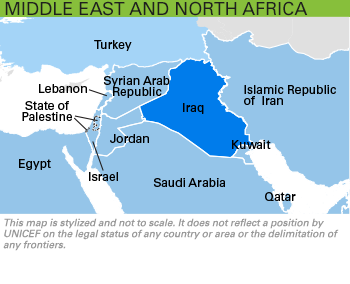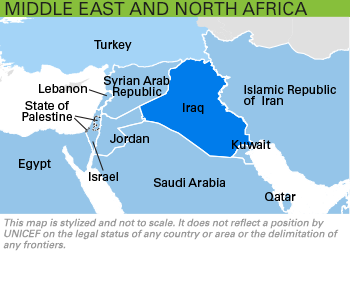IOM Launches Funding Appeal to Address Most Urgent Humanitarian Needs in Areas of Displacement and Return in Iraq
Five years after the onset of the ISIL crisis and the subsequent massive internal displacement, IOM Iraq is launching its funding appeal for emergency assistance in the amount of USD 41.4 million.
Although the number of internally displaced persons (IDPs) has gradually declined since 2017, there are still around 1,750,000 Iraqis living in displacement as of February 2019, due to significant obstacles to return such as damage to houses; lack of livelihoods and basic services; perceptions of insecurity in areas of origin; and mental and psychosocial distress. Around a third of the current population of IDPs, over 530,000 persons, is still living in camps, which require critical support.
IOM’s funding appeal is aligned with the 2019 United Nations’ Humanitarian Response Plan (HRP) for Iraq, which estimates that approximately 6.7 million people are in critical need of support. Nearly 65 per cent of those are concentrated in Ninewa, Anbar, and Salah al-Din, the governorates most severely affected by the recent conflict.
IOM will focus its humanitarian support in Iraq on three groups of concern: IDPs who remain in displacement both within and outside camps, vulnerable host communities in areas of displacement and return – where services are overstretched – and IDPs who have returned to their areas of origin but whose basic humanitarian needs are not being met.
In 2019, IOM plans to maintain its life-saving assistance to IDPs in camp settings through the provision of Shelter and Non-Food Items (NFI) support, providing primary health services, monitoring and addressing protection and psychosocial needs, supporting Water, Sanitation and Hygiene (WASH) services, and supporting camp co-ordination and camp management (CCCM) of IDP camps and informal settlements.
The appeal also includes a request for the continuation of IOM Iraq’s Displacement Tracking Matrix (DTM) which provides real-time reliable quantitative and qualitative data on displacement and returns.
“We highly appreciate IOM’s efforts to provide life-saving humanitarian assistance to displaced families in and out of camps as well as support them upon return their communities of origin. We look forward to our continued cooperation in 2019,” said Naseer Abdel-Sattar, Executive Director of the Joint Coordination and Monitoring Centre (JCMC) of the Government of Iraq.
“The protracted displacement crisis is one of the critical challenges that needs our focused attention, as many displaced people still depend entirely on the provision of humanitarian assistance. The local resources and capacities are already overstretched and pushed to the limit. IOM has been one of the key partners to provide life-saving assistance to the displaced people inside and outside the camps. We value the continued support and cooperation with IOM to support the most vulnerable people,” said Hoshang Mohamed, the Director General of Joint Crisis Coordination Centre (JCC) in Iraq’s Kurdistan Regional Government.
“Funding for humanitarian assistance is crucial to uphold the basic needs and dignity of vulnerable Iraqis in displacement and areas of return. It will prevent a reversal of the gains made to stabilize areas that have been most severely affected by the conflict,” said Gerard Waite, IOM Iraq’s Chief of Mission.
“Through partnership and collaboration with other humanitarian partners, the Government of Iraq, the Kurdistan Regional Government and local NGOs, we hope to address the most critical humanitarian needs while seeking durable solutions for those in protracted displacement,” he added.
The appeal document is available here (Arabic version here)
Click here to watch our video on the Crisis funding appeal.
(Source: UN)



